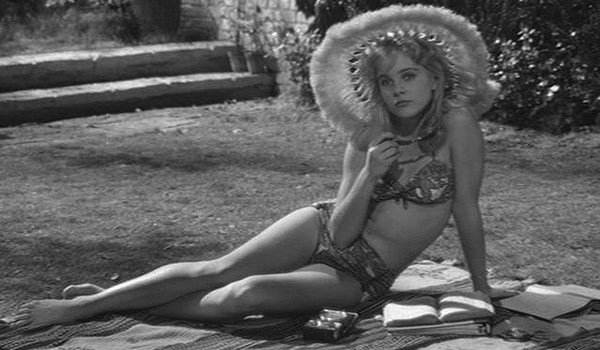Lolita Review
Lolita is a weird movie, even for Stanley Kubrick. The poster for it brilliantly reads “How did they ever make a movie out of Lolita?” It’s a fair question. One can’t help but think it would take a miracle to turn Vladimir Nabokov‘s blistering novel into a movie today—nevermind 1962. But if anyone could pull off this minor miracle, it’s the man himself—Stanley Kubrick. Unfortunately, a few corners needed to be cut in order to make this happen. The young girl’s age is increased—from 12 in the novel to at least 14 in the film. Any explicit mention of a sexual relationship between she and her stepfather is absent. And much of the supposed nuance in the character of Humbert Humbert is missing onscreen because of the storytelling method applied in the print version.
I should say at this point that I haven’t actually read Nabokov’s novel. I come at this from a film-only point of view, but I think the differences between both interpretations are important because they get at what doesn’t work about this film. Does it matter much that the physical nature of Humbert and Lolita’s relationship isn’t shown? Perhaps not. I know it’s not something I’d really want to watch. But it does soften the film’s blow a little. Ditto with what we know about Humbert. Based on everything I’ve read about the novel (which I won’t spoil here), the screen version of him is less complex than his print alter ego. There’s some really juicy backstory that doesn’t get explained but certainly would help us understand why he acts the way he does. And the absence of that also seems to lessen the final impact of the film.
So why three stars? Well, fuck, it’s Kubrick. The man is incapable of failure. From the opening scene, you’re drawn into this bizarre world, and though you’ll just as quickly be repulsed by everyone living in it, it’s something you won’t easily shake. James Mason (of North by Northwest fame) plays Professor Humbert Humbert. As the film opens, he stumbles into a Xanadu-esque mansion that’s littered with empty liquor bottles and other assorted junk. The man he’s looking for is Quilty (Peter Sellers), the man who emptied said bottles. He’s a strung-out loser who can hardly stand, but Humbert is determined to kill him. He asks Quilty if he remembers a girl named Lolita, and after a game of ping pong and half a tune on the piano, Quilty is gunned down.
Flash back a few years, and Humbert is just arriving in America (from Europe), destined for a small university town where he’s starting work as a professor. He finds himself stuck in rural Ohio for a short time and takes up a room at a mostly vacant boarding house. The house’s proprietor is Charlotte Haze (Shelley Winters), a widow with a very active libido. She takes an immediate interest in Humbert, but he takes an immediate interest in her daughter, Lolita (Sue Lyon). After staying with them for weeks, he more or less becomes part of the family, and when Charlotte gives him an ultimatum—”Marry me or leave”—he chooses marriage in order to stay close to his infatuation—Lolita. The consequences of that decision shape the lives of all three individuals, as well as Quilty, who lingers mischievously in the background of their lives, very suspicious of Humbert and his relationship with the girl.
Kubrick goes a marvelous job (shocking, right?) at telling us plenty about the places and people in this film without spelling it out for us with dialogue. Take the opening scene, for example. This home where Quilty is holed up is lavish and absurd—not unlike the man himself, what with all his voices and impersonations. Humbert, meanwhile, is skittish the second he steps across the building’s threshold. He has his gun at the ready, but it’s clear to us he doesn’t know what he’s doing (see also the dreadfully long time it takes him to reload the weapon). This scene is an absolute thing of beauty—one of my favorites in all of Kubrick’s oeuvre. And that’s not just because of Kubrick. The scene, and the film as a whole, wouldn’t work without such outstanding performances from these two featured actors.
James Mason’s Humbert is undeniably a creep, but it’s clear from the outset that his emotions are genuine. Seeing him manipulated would be sad if he wasn’t doing the same thing to Charlotte, but even so, once the film comes full circle (the opening scene is a framing device), we understand a lot more about him, and Mason never wavers in his character’s sincereness.
Peter Sellers, meanwhile, is an animal. Quilty is a character you (deliberately, on Kubrick’s part) never quite get a handle on. Is he messing with these people for fun? Or does he have some other kind of motive? It’s never clear, which is both a blessing and a curse. While it’s an entertaining ride, the resolution feels like a bit of a letdown.
Lolita is a must-watch film, like all of Kubrick’s work, but it’s not nearly as satisfying as something like 2001: A Space Odyssey or Paths of Glory. It’s delightful in a perverse kind of way, and moments are so awkward you’ll want to just curl up in a ball and close your eyes. But two and a half hours later, none of these emotions last, and the final taste in your mouth is minor disappointment for what could have been.
















